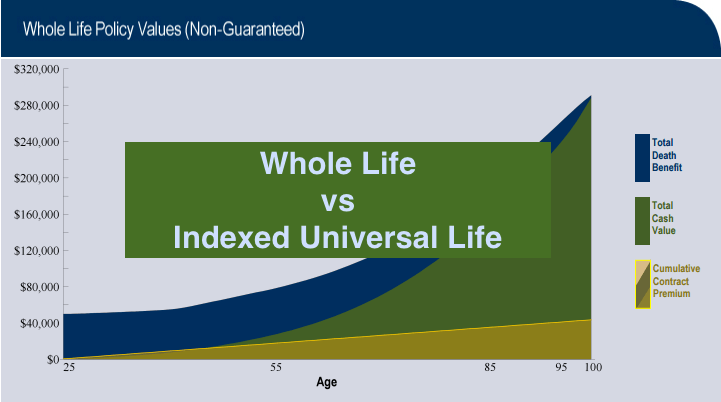All Categories
Featured
Table of Contents
Do they contrast the IUL to something like the Vanguard Total Amount Supply Market Fund Admiral Shares with no tons, an expense proportion (ER) of 5 basis points, a turnover ratio of 4.3%, and an exceptional tax-efficient document of circulations? No, they contrast it to some dreadful proactively handled fund with an 8% tons, a 2% ER, an 80% turnover ratio, and an awful document of temporary capital gain distributions.
Mutual funds commonly make yearly taxed distributions to fund proprietors, even when the value of their fund has dropped in value. Shared funds not only call for income coverage (and the resulting yearly tax) when the shared fund is rising in value, however can additionally enforce earnings tax obligations in a year when the fund has dropped in worth.
You can tax-manage the fund, gathering losses and gains in order to decrease taxable distributions to the investors, yet that isn't in some way going to alter the reported return of the fund. The ownership of shared funds may call for the shared fund owner to pay projected taxes (index universal life vs 401k).

IULs are very easy to place so that, at the proprietor's fatality, the recipient is exempt to either income or inheritance tax. The same tax reduction techniques do not function almost as well with mutual funds. There are numerous, frequently expensive, tax catches connected with the timed trading of common fund shares, traps that do not relate to indexed life Insurance policy.
Opportunities aren't really high that you're going to go through the AMT due to your shared fund circulations if you aren't without them. The remainder of this one is half-truths at best. For example, while it holds true that there is no revenue tax due to your heirs when they inherit the earnings of your IUL policy, it is likewise real that there is no revenue tax obligation due to your successors when they acquire a shared fund in a taxed account from you.
Universal Life Insurance Instant Quote
The government inheritance tax exemption limitation is over $10 Million for a pair, and expanding annually with inflation. It's a non-issue for the vast bulk of doctors, a lot less the remainder of America. There are much better methods to prevent inheritance tax problems than acquiring investments with low returns. Common funds may trigger income taxes of Social Safety advantages.

The growth within the IUL is tax-deferred and may be taken as free of tax revenue via lendings. The plan proprietor (vs. the common fund manager) is in control of his or her reportable income, hence allowing them to reduce or perhaps eliminate the taxation of their Social Safety and security advantages. This is terrific.
Below's an additional very little problem. It holds true if you purchase a common fund for say $10 per share prior to the distribution day, and it disperses a $0.50 distribution, you are then mosting likely to owe taxes (most likely 7-10 cents per share) although that you haven't yet had any type of gains.
However in the end, it's truly about the after-tax return, not exactly how much you pay in tax obligations. You are going to pay more in tax obligations by making use of a taxed account than if you acquire life insurance. But you're also most likely mosting likely to have even more money after paying those tax obligations. The record-keeping requirements for having mutual funds are substantially extra complicated.
With an IUL, one's records are kept by the insurer, copies of yearly statements are sent by mail to the proprietor, and circulations (if any) are amounted to and reported at year end. This set is likewise type of silly. Naturally you need to keep your tax records in instance of an audit.
Index Linked Term Insurance
All you have to do is shove the paper into your tax folder when it appears in the mail. Barely a reason to buy life insurance policy. It's like this individual has actually never ever spent in a taxed account or something. Common funds are generally component of a decedent's probated estate.
In enhancement, they undergo the hold-ups and expenditures of probate. The proceeds of the IUL policy, on the other hand, is constantly a non-probate circulation that passes beyond probate directly to one's called beneficiaries, and is consequently exempt to one's posthumous creditors, unwanted public disclosure, or comparable hold-ups and costs.
We covered this set under # 7, yet just to wrap up, if you have a taxed common fund account, you must put it in a revocable trust (or also easier, make use of the Transfer on Fatality classification) to avoid probate. Medicaid disqualification and lifetime earnings. An IUL can provide their proprietors with a stream of revenue for their entire lifetime, despite for how long they live.

This is beneficial when organizing one's events, and transforming properties to earnings prior to an assisted living facility arrest. Mutual funds can not be transformed in a similar manner, and are generally considered countable Medicaid assets. This is one more silly one promoting that bad people (you understand, the ones that need Medicaid, a government program for the inadequate, to pay for their assisted living facility) ought to make use of IUL rather of common funds.
Disadvantages Of Indexed Universal Life Insurance
And life insurance policy looks dreadful when contrasted rather against a retired life account. Second, people that have cash to buy IUL above and past their pension are mosting likely to have to be horrible at handling money in order to ever before receive Medicaid to spend for their assisted living home costs.
Chronic and incurable ailment rider. All policies will allow a proprietor's easy access to cash money from their policy, commonly waiving any abandonment fines when such individuals experience a serious disease, need at-home treatment, or become restricted to an assisted living home. Shared funds do not provide a similar waiver when contingent deferred sales charges still use to a mutual fund account whose owner requires to market some shares to fund the prices of such a stay.
Universal Life Insurance Premium Calculator
You get to pay more for that advantage (biker) with an insurance policy. What a lot! Indexed universal life insurance policy supplies death benefits to the recipients of the IUL owners, and neither the owner nor the beneficiary can ever before lose money due to a down market. Common funds supply no such assurances or survivor benefit of any kind.
I absolutely do not require one after I get to financial independence. Do I want one? On average, a buyer of life insurance pays for the real cost of the life insurance policy advantage, plus the prices of the policy, plus the earnings of the insurance business.
Index Universal Life Insurance Cost
I'm not entirely sure why Mr. Morais included the whole "you can not lose cash" once again here as it was covered fairly well in # 1. He just wanted to repeat the very best marketing factor for these points I intend. Once again, you do not shed nominal bucks, but you can lose genuine dollars, as well as face severe chance price because of reduced returns.

An indexed universal life insurance coverage plan owner may exchange their policy for a totally different policy without setting off income taxes. A common fund proprietor can not move funds from one shared fund firm to an additional without marketing his shares at the former (hence triggering a taxable occasion), and repurchasing brand-new shares at the latter, usually based on sales costs at both.
While it holds true that you can trade one insurance coverage for another, the reason that individuals do this is that the very first one is such a horrible policy that also after acquiring a brand-new one and experiencing the very early, unfavorable return years, you'll still come out ahead. If they were sold the right plan the very first time, they should not have any kind of need to ever trade it and go with the very early, negative return years once more.
Latest Posts
Universal Life Vs Term Insurance
Iul Insurance For Retirement
Adjustable Life Insurance Vs Universal Life Insurance